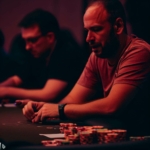The Power of Observation
 Poker is a game of skill, strategy, and intuition. While luck certainly plays a role, the players with a keen sense of observation often come out on top. Additionally, observation is a valuable tool in the high-stakes world of poker, providing an edge in decision-making. Players can enhance their poker skills and boost their chances of success by mastering observation, including deciphering tells and reading body language.
Poker is a game of skill, strategy, and intuition. While luck certainly plays a role, the players with a keen sense of observation often come out on top. Additionally, observation is a valuable tool in the high-stakes world of poker, providing an edge in decision-making. Players can enhance their poker skills and boost their chances of success by mastering observation, including deciphering tells and reading body language.
The Importance of Observation
Observation is the foundation of poker. The ability to gather information about your opponents, their behaviours, and their patterns is essential for making informed decisions. By observing the actions and reactions of fellow players, you can gain valuable insights to predict their next moves or assess the strength of their hands.
Understanding Tells
In poker, a “tell” refers to a subtle behavioural cue a player displays that gives away information about their hand or intentions. Tells can be conscious or unconscious, varying from player to player. Some common examples of tells include:
- Bet Sizing: A sudden increase in bet size may indicate a strong hand, while a decrease in bet size could signal weakness.
- Nervousness: Shaking hands, fidgeting, or rapid breathing can be signs of nervousness, suggesting a player is bluffing or holding a weak hand.
- Eye Contact: Avoiding eye contact or maintaining intense eye contact can indicate strength or weakness, depending on the player.
- Timing: Deliberately pausing before making a decision can be a tactic used to mislead opponents or hide the strength of a hand.
Deciphering Body Language
Beyond verbal and vocal cues, body language provides a wealth of information in a poker game. Observing players’ facial expressions, gestures, and posture can reveal their mindset and potential strategies. Here are a few key body language cues to watch for:
- Facial Expressions: Micro expressions, such as a slight grimace or a raised eyebrow, can betray a player’s genuine emotions and help you gauge the strength of their hand.
- Hand Gestures: Subtle movements like fidgeting with chips, tapping fingers, or repeatedly checking cards can indicate anxiety or confidence, potentially revealing the quality of a player’s hand.
- Posture: Pay attention to how players sit or carry themselves at the table. A relaxed posture might suggest comfort and confidence, while a tense or closed-off posture may indicate insecurity or a weak hand.
 Practical Tips for Observation
Practical Tips for Observation
To maximize the benefits of observation, consider the following practical tips:
- Focus on a Single Player: Instead of trying to observe every player at the table simultaneously, concentrate your attention on one player at a time. This allows you to pick up on subtle nuances and identify unique tells.
- Establish Baselines: Spend time observing your opponents before actively participating in the game. Note their usual behaviours and mannerisms to establish baselines against which you can measure any deviations.
- Act Naturally: Be aware of your behaviour and avoid inadvertently giving away your own tells. Maintain a consistent demeanour and try to control any nervous habits that may reveal the strength of your hand.
- Context Matters: Consider the context in which tells and body language cues occur. A reliable tell for one player may not hold for another. Factor in individual playing styles, experience levels, and emotional states.
The Strategic Advantage
Observation is not only about gathering information but also using it strategically. The insights gained from tells and body language can influence your decision-making process and help you make more accurate judgments. For example:
- Bluffing: Spotting signs of nervousness or weakness in an opponent’s body language can allow them to bluff confidently and convince them to fold.
- Timing Tells: Recognizing timing allows you to exploit opponents who deliberately pause before making a decision. By analyzing their patterns, you can better anticipate their moves and adjust your strategy accordingly.
- Hand Reading: The ability to read your opponents’ hands based on their behaviour can be a game-changer. Identifying solid or weak hands through tells and body language allows you to adjust your bets, control the pot, and make more informed decisions.
Conclusion
Observation, combined with an understanding of tells and body language, is an invaluable skill in poker. Mastering observation grants a significant edge over opponents, improves decision-making, and boosts chances of success. Poker is not just a card game; it’s a psychological battle where observation can make the difference between winning and losing. So, sharpen your senses, pay attention to the details, and let observation become your secret weapon at the poker table.
